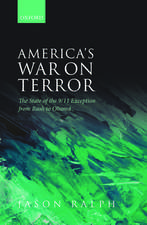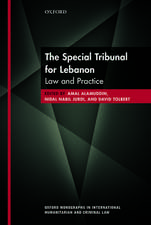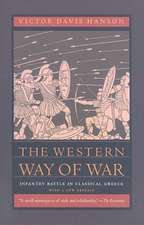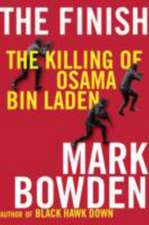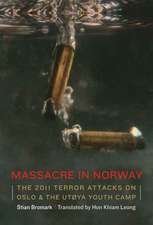An Autumn of War: What America Learned from September 11 and the War on Terrorism
Autor Victor Davis Hansonen Limba Engleză Paperback – 31 iul 2002
Preț: 97.56 lei
Nou
Puncte Express: 146
Preț estimativ în valută:
18.67€ • 19.42$ • 15.41£
18.67€ • 19.42$ • 15.41£
Carte disponibilă
Livrare economică 24 martie-07 aprilie
Preluare comenzi: 021 569.72.76
Specificații
ISBN-13: 9781400031139
ISBN-10: 1400031133
Pagini: 240
Dimensiuni: 135 x 202 x 17 mm
Greutate: 0.25 kg
Ediția:Anchor Books.
Editura: Anchor Books
ISBN-10: 1400031133
Pagini: 240
Dimensiuni: 135 x 202 x 17 mm
Greutate: 0.25 kg
Ediția:Anchor Books.
Editura: Anchor Books
Notă biografică
Victor Davis Hanson was educated at the University of California, Santa Cruz, and the American School of Classical Studies at Athens, and received his Ph.D. in Classics from Stanford University. He farmed full-time for five years before returning to academia in 1984 to initiate a Classics program at California State University, Fresno. Currently, he is Professor of Classics there and Coordinator of the Classical Studies Program.
Hanson has written articles, editorials, and reviews for the New York Times, Wall Street Journal, Daily Telegraph, International Herald Tribune, American Heritage, City Journal, American Spectator, National Review, Policy Review, The Wilson Quarterly, The Weekly Standard, and Washington Times, and has been interviewed on numerous occasions on National Public Radio and the BBC, and appeared with David Gergen on The NewsHour with Jim Lehrer. He writes a biweekly column about contemporary culture and military history for National Review Online.
He is also the author of some eighty scholarly articles, book reviews, and newspaper editorials on Greek, agrarian, and military history, and contemporary culture. He has written or edited eleven books, including The Western Way of War, The Soul of Battle, and Carnage and Culture. He lives and works with his wife and three children on their forty-acre tree and vine farm near Selma, California, where he was born in 1953.
Hanson has written articles, editorials, and reviews for the New York Times, Wall Street Journal, Daily Telegraph, International Herald Tribune, American Heritage, City Journal, American Spectator, National Review, Policy Review, The Wilson Quarterly, The Weekly Standard, and Washington Times, and has been interviewed on numerous occasions on National Public Radio and the BBC, and appeared with David Gergen on The NewsHour with Jim Lehrer. He writes a biweekly column about contemporary culture and military history for National Review Online.
He is also the author of some eighty scholarly articles, book reviews, and newspaper editorials on Greek, agrarian, and military history, and contemporary culture. He has written or edited eleven books, including The Western Way of War, The Soul of Battle, and Carnage and Culture. He lives and works with his wife and three children on their forty-acre tree and vine farm near Selma, California, where he was born in 1953.
Extras
I.
September
(The destruction of the World Trade Center; the attack on the Pentagon; the explosion of four jet airliners; President Bush's promises of a worldwide war on terror; dispatch of American carriers to the Indian Ocean; initial criticism of proposed American response both at home and abroad)
During the three-week lull between September 11 and our military response in early October, it was not clear when and if America would strike back. Despite our president's immediate and firm assurance that we would battle terrorists across the globe for years to come, critics both here and abroad immediately questioned the morality of our tactics in bombing the terrorist enclaves in Afghanistan and the military feasibility of finding the al-Qaeda camps--and then destroying them without either killing scores of innocent civilians or causing such disruption as to precipitate wide-scale starvation and disease.
In addition, we did not know exactly the number of our own dead, as casualties on September 11 were at first feared to be in the tens of thousands, before generally being reduced to a round figure of between seven thousand and three thousand killed--a total by January 2002 that would be generally recognized as around three thousand fatalities. Both friends in Europe and neutrals and enemies in the Middle East demanded "proof" that bin Laden had, in fact, masterminded the attacks. Yet throughout these dark days, the Taliban and al-Qaeda alike promised annihilation for any Americans foolish enough to enter Afghanistan and raised the specter of further terrorist attacks here and abroad against the United States.
In the numbing aftermath of September 11, Americans were presented with a daily variety of myths--military, cultural, and political--designed to temper our military response. I was chiefly worried that we were awash in a sea of false knowledge concerning everything from the military history of Afghanistan, the lessons of Vietnam, misinformation about the Northern Alliance, half-truths about the effectiveness of our air forces, the purportedly hopeless struggle against a "new" form of terror, the reasons for al-Qaeda's assault, and the nature of American foreign policy in the Middle East.
September was perhaps the most hectic and depressing month in our nation's history. In the following nine essays, composed in those times of chaos and uncertainty, I employed occasional parody, posed counterfactual scenarios, and drew on classical history--as well as the careers of General Sherman and Winston Churchill, the 2,500-year Western military tradition, the heroism of the New York policemen and firefighters, and our struggle against the Japanese during World War II--all to argue that we had no choice but to counterattack long and hard in Afghanistan.
September
(The destruction of the World Trade Center; the attack on the Pentagon; the explosion of four jet airliners; President Bush's promises of a worldwide war on terror; dispatch of American carriers to the Indian Ocean; initial criticism of proposed American response both at home and abroad)
During the three-week lull between September 11 and our military response in early October, it was not clear when and if America would strike back. Despite our president's immediate and firm assurance that we would battle terrorists across the globe for years to come, critics both here and abroad immediately questioned the morality of our tactics in bombing the terrorist enclaves in Afghanistan and the military feasibility of finding the al-Qaeda camps--and then destroying them without either killing scores of innocent civilians or causing such disruption as to precipitate wide-scale starvation and disease.
In addition, we did not know exactly the number of our own dead, as casualties on September 11 were at first feared to be in the tens of thousands, before generally being reduced to a round figure of between seven thousand and three thousand killed--a total by January 2002 that would be generally recognized as around three thousand fatalities. Both friends in Europe and neutrals and enemies in the Middle East demanded "proof" that bin Laden had, in fact, masterminded the attacks. Yet throughout these dark days, the Taliban and al-Qaeda alike promised annihilation for any Americans foolish enough to enter Afghanistan and raised the specter of further terrorist attacks here and abroad against the United States.
In the numbing aftermath of September 11, Americans were presented with a daily variety of myths--military, cultural, and political--designed to temper our military response. I was chiefly worried that we were awash in a sea of false knowledge concerning everything from the military history of Afghanistan, the lessons of Vietnam, misinformation about the Northern Alliance, half-truths about the effectiveness of our air forces, the purportedly hopeless struggle against a "new" form of terror, the reasons for al-Qaeda's assault, and the nature of American foreign policy in the Middle East.
September was perhaps the most hectic and depressing month in our nation's history. In the following nine essays, composed in those times of chaos and uncertainty, I employed occasional parody, posed counterfactual scenarios, and drew on classical history--as well as the careers of General Sherman and Winston Churchill, the 2,500-year Western military tradition, the heroism of the New York policemen and firefighters, and our struggle against the Japanese during World War II--all to argue that we had no choice but to counterattack long and hard in Afghanistan.
Recenzii
“Bold and politically incorrect, An Autumn of War is like a breath of fresh air in pointing to the real causes of terrorist outrages and the need for a decisive response.” —Richard Pipes, author of The Russian Revolution
“Victor Hanson is a national treasure. No one has written with such great prescience about the present war or more accurately predicted the course of events, on the fighting front, at home, and around the world. His wisdom arises from a deep knowledge and understanding of history, ancient and modern. His uncanny accuracy in prediction comes from a full and clear grasp of the facts and the application to them of an informed understanding of human nature and of the character of war. All this he presents in clear, vigorous, and eloquent prose. Every American needs to learn from him." —Donald Kagan, author of On the Origins of War and the Preservation of Peace
“Together with John Keegan, [Hanson] is our most interesting historian of war.” —Jean Bethke Elshtain, author of Women and War
“Victor Hanson is a national treasure. No one has written with such great prescience about the present war or more accurately predicted the course of events, on the fighting front, at home, and around the world. His wisdom arises from a deep knowledge and understanding of history, ancient and modern. His uncanny accuracy in prediction comes from a full and clear grasp of the facts and the application to them of an informed understanding of human nature and of the character of war. All this he presents in clear, vigorous, and eloquent prose. Every American needs to learn from him." —Donald Kagan, author of On the Origins of War and the Preservation of Peace
“Together with John Keegan, [Hanson] is our most interesting historian of war.” —Jean Bethke Elshtain, author of Women and War
Descriere
Inviting readers across the spectrum to think about September 11 and its aftermath in new and more complicated ways, this volume is a collection of online essays posted by one of the best-known historians in America.

